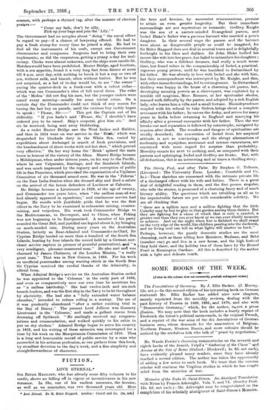FICTION.
LOVE ETERNAL.•
SIR RIDER HAGGARD, who has already some fifty volumes to his credit, shows no falling off in vigour or inventiveness in his new romance. In She, one of his earliest successes, the heroine, as well as we remember, was two thousand years old. Here • hove Eternal, By H. Rider Haggard. London Cassell and Co. lea mi.) manner of election the hero and heroine, by successive reincarnations, promise to attain an even greater longevity. But their immediate surroundings are not mysterious or romantic. Godfrey Knight was the son of a narrow-minded Evangelical parson, and Isobel Blake's father was a parvenu baronet who married a peer's daughter. In their several ways the parson and the baronet were about as disagreeable people as could be imagined, for Sir Rider Haggard does not deal in neutral tones and is delightfully forthright in his likes and dielikes. Sir John Blake bullied his mouse-like wife into her grave, but failed to intimidate his daughter ; Godfrey, who was a diffident dreamer, had really a much worse time, but found solace in the companionship of Isobel, a practical, vigorous young person, until he was banished to Switzerland by his father. He was already in love with Isobel and she with him, but their correspondence was intercepted by Mr. Knight, and this, with other misunderstandings, led to estrangement. In Switzerland Godfrey was happy in the house of a charming old pastor, but, developing amazing powers as a clairvoyant, was exploited by a terrible old magician, Mine. Riennes, at her spiritualist seankes, rescued with difficulty by the pastor, and adopted by a rich English lady, who leaves him a villa and a small fortune. His independence coupled with his refusal to take Orders, brings about a complete severance with his father; he enters the Anny, and serves for many years in India before returning to England and marrying his affinity after a personal encounter with her father. Then the war breaks out and separation is followed by catastrophe, mitigated by reunion after death. The wonders and dangers of spiritualism are vividly described; the conversion of Isobel from her sceptical attitude is not so convincing; and the abrupt alternations of modernity and mysticism, sentiment and intense earnestness, are contrived with more regard for surprise than probability. Heredity counts for next to nothing, and, as compared with their parents and upbringing, Isobel and Godfrey are freaks. But, with all deductions, this is an interesting and at times a thrilling story.


































 Previous page
Previous page